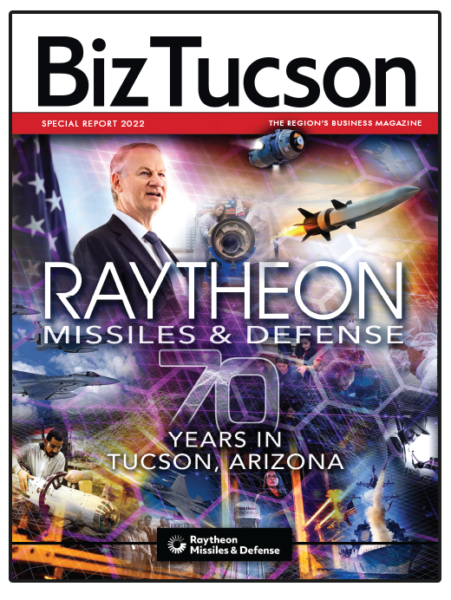
A Kingpin of Community
Raytheon’s Culture Prioritizes Philanthropy, Outreach
By Jay Gonzales
While Raytheon Missiles & Defense has a massive manufacturing operation south of Tucson International Airport, its presence is felt everywhere in the community.
Alex Beresford, a Raytheon systems engineer, is one of the company’s thousands of employees who dedicates her free time – plus the time Raytheon willingly allows each employee to donate during work hours–to the community.
“Raytheon is such a large part of the Tucson community. With our number of employees and the size of the business, we like to leverage that to give back to the place that we live,” Beresford said. “We’re in Central Tucson. We’re in Downtown Tucson. We’re in South Tucson. To me, that’s what our community outreach is all about, seeing that impact that we’re having in the place that we’re actually working.”
With the size and high profile Raytheon has in the region, there’s an expectation that community support and outreach come with the territory. Raytheon gladly accepts the responsibility and – as one might expect – has an infrastructure within the organization to allow employees like Beresford and Senior Mechanical Engineer Alonso Garcia to get out into the community to support causes they love.
“The company has a strategy around outreach and there is a business purpose behind it,” said Shalane Simmons, manager of corporate and social responsibility at Raytheon Missiles & Defense. “We focus mostly on STEM education and military and veteran support, but the company is also flexible and encourages its employees to go volunteer at the Humane Society, local shelters – really whatever they’re passionate about.”
“Twenty years ago, I don’t know if managers at many large companies would have said, ‘I want my employee to leave at 2:00 in the afternoon to go volunteer.’ It’s a shift of culture not just in the industry, but in society. I think Raytheon does a really good job of supporting that.”
Beresford and Garcia both are involved in working to increase student interest in the STEM fields – science, technology, engineering and math, efforts that might ultimately benefit Raytheon by adding to the talent pool. For them, it’s more about giving back because of their experiences pondering their own futures and careers.
Garcia, whose parents were factory workers who immigrated from Mexico, has the added inspiration from personal experience to zero in on the underrepresented populations in STEM. His father became a machinist in Tucson, as they settled where Garcia would eventually attend Flowing Wells High School.
“The primary reason I’m giving back to this day and will continue to give back is because of the debt that I think that I owe − to pay it forward − for the multitude of mentors and programs that helped me out,” Garcia said. “It starts with a dream that someone instills in you.”
Garcia’s dream and his mentors directed him to Cornell University, where he got the engineering degree that eventually led him to Raytheon. The MESA outreach program (Mathematics, Engineering, Science Achievement) was there for Garcia when he was in high school, and he now gives his time to the organization.
“It was there for me as a student getting that awareness as to what an engineer actually does,” Garcia said. “It was providing that knowledge and that awareness to demystify the process, demystify college, demystify engineering, and then show a path.”
The community outreach also comes from the highest levels at Raytheon. Executives give their time and expertise to numerous boards and committees that impact economic development, social issues and education.
Wesley D. Kremer, president of Raytheon Missiles and Defense, sits on the Chairman’s Circle of Sun Corridor Inc., the region’s economic development arm. Raytheon employees are increasingly involved at Pima Joint Technical Education District as teachers for students aiming to learn a trade they could use at Raytheon, said Pima JTED Superintendent and CEO Kathy Prather.
Beresford volunteers at the Humane Society because of her love for animals.
“The people that I’m connecting with and the work that I’m doing in the community just makes me value being here in Tucson and being at this company,” Beresford said. “I feel that if I didn’t know anybody coming to the company, I can very easily find people with common interests, and we can then go out together and volunteer or pull together a group to make a difference.”
“All of that makes what I do outside of work so much fun. I’m not sitting at home. I know that I’m doing something that I find important.”






